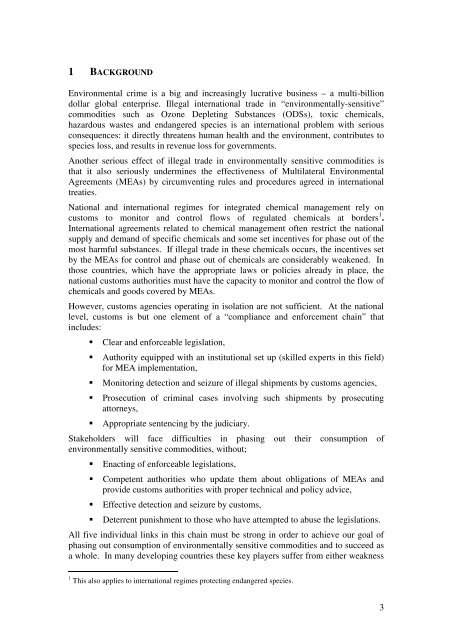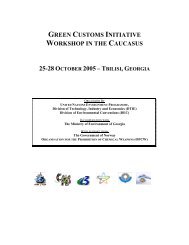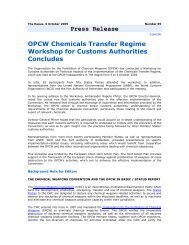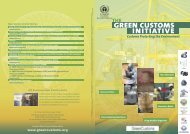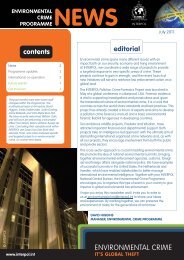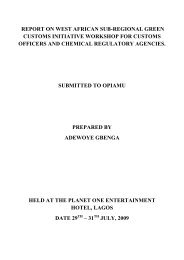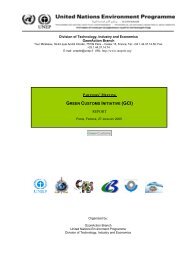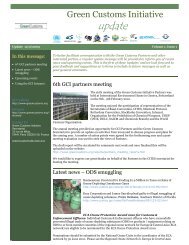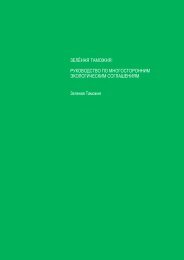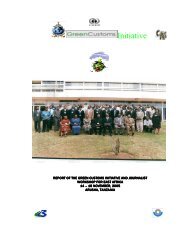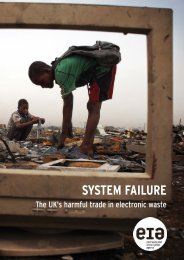Bhutan - Green Customs Initiative
Bhutan - Green Customs Initiative
Bhutan - Green Customs Initiative
Create successful ePaper yourself
Turn your PDF publications into a flip-book with our unique Google optimized e-Paper software.
1 BACKGROUND<br />
Environmental crime is a big and increasingly lucrative business – a multi-billion<br />
dollar global enterprise. Illegal international trade in “environmentally-sensitive”<br />
commodities such as Ozone Depleting Substances (ODSs), toxic chemicals,<br />
hazardous wastes and endangered species is an international problem with serious<br />
consequences: it directly threatens human health and the environment, contributes to<br />
species loss, and results in revenue loss for governments.<br />
Another serious effect of illegal trade in environmentally sensitive commodities is<br />
that it also seriously undermines the effectiveness of Multilateral Environmental<br />
Agreements (MEAs) by circumventing rules and procedures agreed in international<br />
treaties.<br />
National and international regimes for integrated chemical management rely on<br />
customs to monitor and control flows of regulated chemicals at borders 1 .<br />
International agreements related to chemical management often restrict the national<br />
supply and demand of specific chemicals and some set incentives for phase out of the<br />
most harmful substances. If illegal trade in these chemicals occurs, the incentives set<br />
by the MEAs for control and phase out of chemicals are considerably weakened. In<br />
those countries, which have the appropriate laws or policies already in place, the<br />
national customs authorities must have the capacity to monitor and control the flow of<br />
chemicals and goods covered by MEAs.<br />
However, customs agencies operating in isolation are not sufficient. At the national<br />
level, customs is but one element of a “compliance and enforcement chain” that<br />
includes:<br />
Clear and enforceable legislation,<br />
Authority equipped with an institutional set up (skilled experts in this field)<br />
for MEA implementation,<br />
Monitoring detection and seizure of illegal shipments by customs agencies,<br />
Prosecution of criminal cases involving such shipments by prosecuting<br />
attorneys,<br />
Appropriate sentencing by the judiciary.<br />
Stakeholders will face difficulties in phasing out their consumption of<br />
environmentally sensitive commodities, without;<br />
Enacting of enforceable legislations,<br />
Competent authorities who update them about obligations of MEAs and<br />
provide customs authorities with proper technical and policy advice,<br />
Effective detection and seizure by customs,<br />
Deterrent punishment to those who have attempted to abuse the legislations.<br />
All five individual links in this chain must be strong in order to achieve our goal of<br />
phasing out consumption of environmentally sensitive commodities and to succeed as<br />
a whole. In many developing countries these key players suffer from either weakness<br />
1 This also applies to international regimes protecting endangered species.<br />
3


